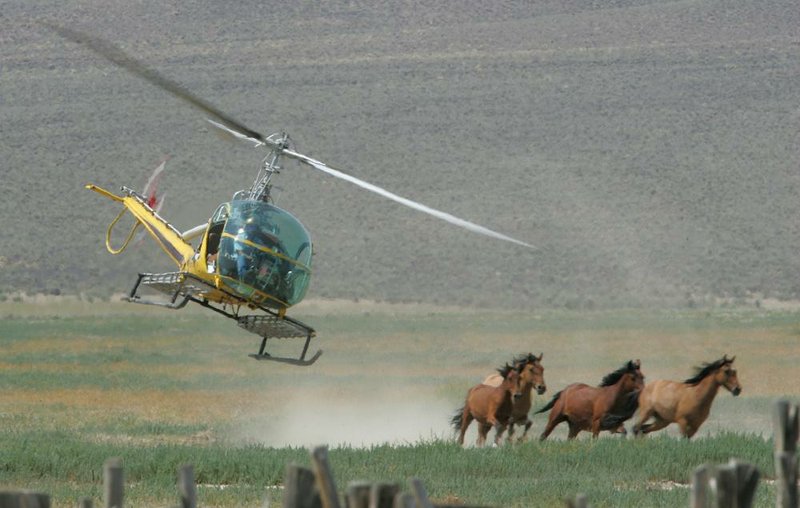RENO, Nev. -- Despite overall numbers in the tens of thousands, mustang advocates say the wild horse is on the verge of extinction in North America for the second time in 13,000 years.
Efforts to halt mustang roundups in Congress and the courts have been unsuccessful over the past decade, but two groups in a petition to the U.S. Fish and Wildlife Service are focusing on genetics and research they say prove the horses are a native species.
They say growing threats from development, livestock grazing and government gathers are jeopardizing the genetic viability of individual herds in 10 states from California to Montana.
"Nothing else is working. This is a different avenue," said Michael Harris, a lawyer for Friends of Animals, a nonprofit animal rights group that filed the petition with the Colorado-based horse group, The Cloud Foundation.
The petition states mustang habitat has shrunk 40 percent since President Richard Nixon signed the Free Roaming Wild Horse and Burro Act into law in 1971. It advances an argument that the Bureau of Land Management long has rejected -- that the wild horse is a native species that only temporarily went extinct on the continent 11,000 to 13,000 years ago before Spanish conquistadors reintroduced it to North America in the 1500s.
The call for protection comes as Bureau of Land Management insists the public range land -- much of it in the throes of drought -- is being degraded by an overpopulation of nearly 50,000 horses and burros, about half of them in Nevada.
The petition accuses the agency of undermining U.S. law protecting mustangs by abusing its authority to order roundups based on a determination that the herds are in "excess" to further the agency's interest in minimizing competition with wildlife, cattle and sheep.
While the Bureau of Land Management estimates 49,208 horses and burros are on the range, the petition said none of the isolated herds number anywhere near the 2,500 most biologists consider necessary to keep a distinct species viable. About three-fourths have fewer than 150 horses, it said.
Harris, legal director of the wildlife program at Friends of Animals, admits it may be tough to sell the public on the idea that the mustangs are endangered given there are thousands in Nevada alone.
"But I don't think it will be a hard sell at all to the biologists at the Fish and Wildlife Service who examine the question of genetic viability over and over when it comes to endangered species," he said Friday.
The Nevada Cattlemen's Association and the Public Lands Council are among those arguing the petition is invalid because the horses aren't native to North America. They say protection afforded mustangs under the Wild Horse and Burro Act is undercut by the Bureau of Land Management's failure to keep herd sizes in check.
"The federal government is buckling to pressures from the misguided special-interest groups that don't want to see 'wild' horses brought off the range," said Dustin Van Liew, executive director of the council tied to the National Cattlemen's Beef Association. "Listing wild horses under the ESA -- which is meant for wildlife, not domesticated, non-native animals -- would only serve as another demonstration of just how damaging that statute is."
The Bureau of Land Management spokesman Celia Boddington said Friday that the agency hasn't changed its longstanding position that today's American wild horses are not "native."
"American wild horses are descended from domestic horses, some of which were brought over by European explorers in the late 15th and 16th centuries, plus others that were released or escaped captivity in modern times," the group's website states.
The petition filed June 11 points to recent research concluding that the modern horse originated in North America 3 million to 4 million years ago, spread to Eurasia by crossing the Bering land bridge 2 million to 3 million years ago and became extinct in North America no longer than 13,000 years ago.
It cites the work of Jay Kirkpatrick, a leader in horse-reproduction research who directs ZooMontana's Science and Conservation Center in Billings, Mont.
"It is native to North America," Kirkpatrick said. "The Spanish were bringing them home."
A Section on 06/29/2014

